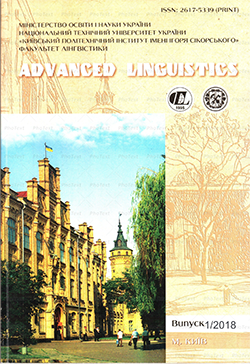“I-CONCEPT” AS A MOTIVATIONAL FACTOR OF THE CADETS’ PROFESSIONAL FLIGHT COMPETENCES FORMATION IN THE UKRAINIAN SYSTEM OF MILITARY HIGHER EDUCATION
DOI:
https://doi.org/10.20535/2617-5339.2018.1.148842Ключові слова:
“I-concept”, “I-image” of the pilot, professional competences, professional “I”.Анотація
The article deals with the problem of a pilot’s I-concept formation as a motivational factor of the acquisition of flight competencies by cadets. The issue of “I-concept” is still not highlighted in the special scientific literature. The author, based on the analysis of existing sources, results of the experiment conducted on the basis of the Ivan Kozhedub Kharkiv National University of Air Forces, and his own experience of training cadet pilots as well, reveals the significance of the sphere of consciousness, known as “I-concept” (and “I-image” as its component), in the formation of professional competencies of the students. Its motivational role in their training is proved. The dynamics of psych emotional stereotypes, attitudes and rational components of professional self-awareness in the process of obtaining higher education in general and in training in particular is defined. Within the framework of the conducted experiment, the main characteristics of the future pilot’s personality were formulated, as well as the ways of their formation due to the expedient modification of educational conditions; the markers and criteria for evaluating their development were singled out. In the paper we have outlined such psychological and didactic components of the self-image of the future military pilot as: awareness, interest and need for planning and the actual ability to work productively in the direction of acquiring a system of knowledge, skills and opportunities to solve professional flight tasks; the orientation of the cadet on the didactic sensitivity to the introduction of modern technologies of training and interest in IT technologies; subjective vision of themselves as a highly professional and highly motivated specialists; objective vision and assessment by the instructor-teaching staff of external (competent) and internal (psychological) professional qualities of the cadet. To test the hypothesis and the experimental formation of such an image, a number of psychological-didactic methods and practices were implemented. The article also highlights the importance of training, which has great potential for diagnosing and correcting professionally significant qualities.
Посилання
Asrijan, V. L. (2007). Formirovanie special'nyh umenij u budushhih pilotov mezhdunarodnyh avialinij na osnove mezhpredmetnyh svіjazej tehnicheskih disciplin [Formation of special skills of future pilots of international airlines on the basis of interdisciplinary links of technical disciplines]. (PhD thesis). Kirovograd.
Berns, R. (1986). Razvitiye Ya-kontseptsii i vospitaniye [Development of I-concept and education]. М.: Progress.
Vorona, A. A., Gander, D. V., & Ponomarenko, V. A. (2000). Psihologo-pedagogicheskie osnovy professional'noj podgotovki letnogo sostava [Psychological and pedagogical basis of professional training of a flight crew]. M.: Mapchak.
Zelenskaja, L. M. (2006). Metody obuchenija discipline “Bezopasnost’ poletov” budushhih pilotov v vysshih uchebnyh zavedenijah [Methods of teaching the discipline “Safety of flights” of future pilots in higher educational institutions]. (PhD thesis). Kirovograd.
Kozlov, V. V. (2010). Bezopasnost’ poljotov: ot obespechenija k upravleniju [Safety of flights: from security to management]. M.: Operativnaja poligrafija.
Ladogubets, N.V., Marchenko, O.G. (2014) Do pytannya profesіynoї pіdgotovki lyotnogo skladu tsyvіlnoї ta vіyskovoї avіatsії [On the issue of professional training of civilian and military aircraft]. Vіsnik Natsіonalnogo aviatsiynogo unіversitetu. Serіya:Pedagogіka. Psykhologіya: zb. nauk. pr., 5(1), 75-80.
Makarov, R. N., Nedil'ko, S. N., Bamburkin, A. P., Grigoreckij, V. A. (2005). Aviacionnaja pedagogika [Aviation pedagogy]. Kirovograd: Mnapchak, GLAU.
Panfilov, O. Ju. (2016). Systema vijsjkovoji osvity Ukrajiny jak ramkova umova formuvannja osobystosti vijsjkovogho kerivnyka [The sytem of military education in Ukraine as a framework condition for the formation of a military leader's personality]. Zbirnyk naukovykh pracj Kharkivsjkogho universytetu Povitrjanykh Syl, 3, 201–204.
Smirnova, I. L. (2007). Formirovanie integrativnyh teoreticheskih znanij po special’nym disciplinam u budushhih pilotov[Formation of integrative theoretical knowledge in special disciplines for future pilots]. (PhD thesis). Kirovograd.
Surkova, E. V. (2013). Metodologicheskie osnovy sravnitel’nogo issledovanija professional'noj podgotovki budushhih aviadispetcherov [Methodological bases of comparative study of professional training of future air traffic controllers]. Problemy sovremennoj nauki: sb. nauch. trudov, 7, 184–189.
Jagupov, V. V. (2004). Vіjs’kova psihologіja [Military Psychology]. K.: Tandem.
##submission.downloads##
Номер
Розділ
Ліцензія
Наше видання використовує положення про авторські права CREATIVE COMMONS для журналів відкритого доступу.
Автори, які публікуються у цьому журналі, погоджуються з наступними умовами:
1. Автори залишають за собою право на авторство своєї роботи та передають журналу право першої публікації цієї роботи на умовах ліцензії Creative Commons Attribution License, котра дозволяє іншим особам вільно розповсюджувати опубліковану роботу з обов'язковим посиланням на авторів оригінальної роботи та першу публікацію роботи у цьому журналі.
2. Автори мають право укладати самостійні додаткові угоди щодо неексклюзивного розповсюдження роботи у тому вигляді, в якому вона була опублікована цим журналом (наприклад, розміщувати роботу в електронному сховищі установи або публікувати у складі монографії), за умови збереження посилання на першу публікацію роботи у цьому журналі.

